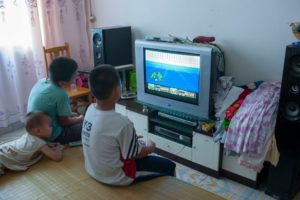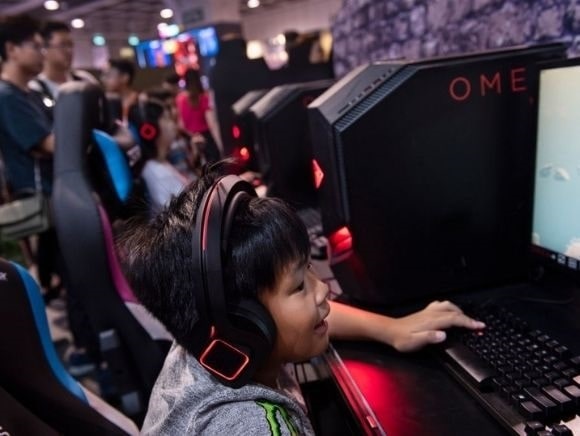The number of freedoms afforded to citizens in China can be counted on one hand. Now that the country is ostensibly moving on from the coronavirus pandemic, the red dragon is going scorched earth on an already scarce list of liberties. Western progressives might be salivating over how much Big Brother cracks down and reins in everything the Politburo of the Chinese Communist Party disapprove of in the marketplace and households, but while the schoolmarms cannot go full authoritarian back home, they can embrace a critical and obscure object of desire within modern-day militant leftism: the nudge.
The ‘Spiritual Opium’ of Video Games

(Photo by Wolfgang Kaehler/LightRocket via Getty Images)
Economic Information Daily, an affiliate with the nation’s largest state-run news outlet, Xinhua, published an article describing video games as “spiritual opium.” The newspaper opined that “no industry, no sport, can be allowed to develop in a way that will destroy a generation.” The article further noted that authorities, families, and game developers needed to coalesce to fight child addiction to online video games, adding that the parents need to do a better job of supervision since it can be challenging for companies and the government to insert limitations on young users’ time.
The terminology was deliberate since opium is a sensitive term in China amid widespread addiction in the mid-19th century. The state media report was construed as a warning shot, prompting businesses like Tencent Holdings to explore curbing minors’ access to online games. The piece also lowered U.S. and European gaming companies’ shares, including Electronic Arts and Activision Blizzard. Industry observers are fearful that this could be a part of the government’s broader war on big tech. Beijing has been setting its sights on cryptocurrencies, ride-sharing giant Didi, and a diverse array of mobile applications. The purpose is to protect national data security. Still, it could be another facet of the autocratic regime’s goal of control over every aspect of the population’s day-to-day lives. As a result, the CCP gives Western leftists unnecessary ideas to truncate individual sovereignty and exert greater influence in the public’s daily decisions.
Choice Is an Illusion?
A pivotal precept of neoteric progressivism is to diminish choice, which spotlights the left’s objections to a free market. They fail to accept that a market-oriented economy cannot be molded to their central-planning whims. When people can voluntarily exchange goods and services in a free society, it is more challenging to push the people into wanting want the progressives demand. A free society satisfies the people’s cravings, while a world run by hall monitors suppresses those wishes. As the eminent economist Milton Friedman wrote, “At the bottom of many criticisms of the market economy is really lack of belief in freedom itself.” The most prevalent and recent example of this is the coronavirus vaccine. The central planners cannot fathom that millions of Americans do not want to be jabbed with two-dose vaccinations from Pfizer or Moderna, threatening them with expulsion and mandatory movement licenses and casting them out like lepers. Whether immunization mandates are the next step or not remains to be seen, but it is this aggressive nudge that paternalists rely upon that falls just short of what China employs.
For decades, the government has resorted to both passive and belligerent micromanaging to turn the populace in a specific direction. Statists claim they are not forcing anyone to do anything, but rather merely encouraging people to embrace a lifestyle they deem acceptable, something that legal scholar Cass Sunstein extensively wrote about in his book, Nudge: Improving Decisions About Health, Wealth, and Happiness. He and co-author Richard Thaler penned:
“A nudge, as we will use the term, is any aspect of the choice architecture that alters people’s behavior in a predictable way without forbidding any options or significantly changing their economic incentives. To count as a mere nudge, the intervention must be easy and cheap to avoid. Nudges are not mandates. Putting fruit at eye level counts as a nudge. Banning junk food does not.”
Today, statists will aver that Americans can achieve their liberation from lockdowns and decrees by accepting vaccinations and wearing masks (again). On the monetary front, central banks artificially slashing interest rates to nearly zero send consumers on the hunt for greater returns by diving into the risky stock market arena. Policymakers will impose tax advantages to increase homeownership rates. Agencies will add “9 out of 10 people pay their taxes on time” prompts on forms to get taxpayers to make punctual payments. These pesky little things, emanating from the world of behavioral economics, attempt to influence decision-making in a way the bureaucrats incline.
 Indeed, nudging exists in the marketplace to facilitate particular reactions, such as a for-sale sign to generate a sale, an upsell to add to the total amount, or a photo of former President Donald Trump in the middle of Greenwich Village to anger a hipster. However, when officials do the nudge, watch out.
Indeed, nudging exists in the marketplace to facilitate particular reactions, such as a for-sale sign to generate a sale, an upsell to add to the total amount, or a photo of former President Donald Trump in the middle of Greenwich Village to anger a hipster. However, when officials do the nudge, watch out.
Dictators or Nudgers?
Video game culture is enormous in China, much like it is in North America. But are the Chinese leaders apprehensive of clamping down on an activity that elicits immense passion among the young whippersnappers? If so, is this why they published a passive-aggressive newspaper op-ed? And is this a nudge to discourage gaming and encourage something the government believes is more productive? Whatever happens, there are ostensibly degrees of authoritarianism. Beijing maintains its social credit system, while America is populated with indoctrinated millennials actively fighting against their own rights in the crusade of wokeness, political correctness, and social media virtue signaling. In one country, the government is dictating. In another, a significant portion of the nation is demanding to be dictated – with or without a nudge.
~
Read more from Andrew Moran.




